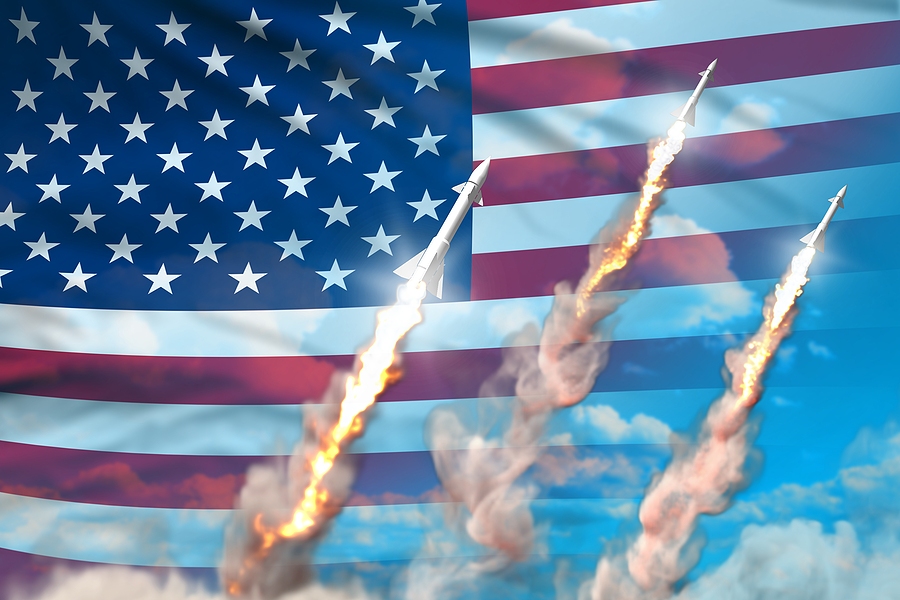The Cold War ended in 1991. The United States’ commitment to prevent its adversaries’ nuclear ambitions and to extend its nuclear arsenal as an umbrella of protection to its partners has remained intact over the last 30-plus years. This has not remained without challenges as the responsibility of the West to lead diplomatic resolutions with arms control agreements has been tested by Russia, refused by China, and taunted by Iran in developing destabilizing uranium-enrichment facilities.
The Trump administration, U.S. military leaders and policymakers must use strategic thinking in their efforts to deter nuclear aggression in the minds of American and allied partners’ adversaries. History is being written today to redefine the future of strategic nuclear deterrence, nuclear modernization, and arms control agreements. The moment for the West to assure its allies and deter its adversaries is here.
Peace through strength, of America’s nuclear triad intersecting land, air, sea with connectivity into space and cyberspace, is a military capability that Iran does not have and will never achieve. Iran, a nation of state-sponsored terrorism, pursued uranium enrichment that yielded enough production to develop several nuclear warheads. This production could also yield dirty bombs, and while not existential, could produce isolated nuclear effects against its targets. Israel’s elimination of Iranian uranium enrichment facilities and personnel, along with the United States’ response through Operation Midnight Hammer, protected its borders and the Free World from the escalated risks of nuclear effects.
The sophistication of Russian nuclear systems and advancements within the Chinese nuclear arsenal are the largest challenges for the United States. The American response to Iran’s continuous and crude attempts to threaten Israeli sovereignty should consider the methodological calculations of Russia and China as nuclear-armed nations.
While Trump is America’s commander-in-chief, the role of the president is also America’s diplomat-in-chief, as constitutionally designated by the United States’ organization of the executive branch of government. The peace through strategy, in engaging with foreign heads of state, is the central responsibility to unite a global message for Western and European leaders. This includes President Xi Jinping of China and President Vladimir Putin of Russia engaging in arms control agreements, along with deterring the Iranian pursuit of a nuclear weapon.
The nation that leads diplomatic resolve in this moment of contested aggression will lead nuclear and strategic deterrence efforts for generations. There is no greater stake and risk of loss than the failure of nuclear deterrence negotiations. The opportunity for bloodshed to cease in the Middle East and within Eastern Europe against Ukraine can be achieved through strategic nuclear deterrence negotiations. These are not isolated, but intertwined, geopolitical opportunities for Trump to lead and shepherd in America’s golden age, along with implementing a roadmap to effective nuclear deterrence and lasting peace.
Congress must work to support the executive branch with authorization and appropriation support of nuclear modernization and the development of America’s Golden Dome in this new, post-Cold War era of strategic deterrence. America is effective in nuclear negotiations only when its arsenal and warfighters are “ready for the fight tonight,” in the eyes of the ayatollah and authoritarian regimes. A whole-of-government approach, including unified leadership across the Defense, and State departments and intelligence agencies, will aid informed decisions of America’s response domestically and to its partners abroad.
Historically, strategic deterrence has been viewed as the question of whether a nation would trade (or lose) a city within its borders in defense or offense of another abroad. This central question of restraint remains intact, as the philosophy of a nuclear war cannot be won and should not be fought. Modernization and development of nuclear capabilities to protect the homeland and ensure global security are paramount for the United States, and this priority, as witnessed in the Israeli-Iranian conflict, cannot be discounted as a function of strategic deterrence.
Strategic deterrence continues to be led by the United States and its partners. The New START Agreement, between Russia and the United States, expires in February 2026. Arms control negotiations with China and Russia must remain a priority of the administration. Diplomatic efforts ensure peace through strategy to defend our country at a time when nuclear deterrence is challenged.


